- HOME
- ABOUT ME
- movies
- MEDIA
- L.Onerva
- Eino Leino
- Eeva-Liisa Manner
- Erään Opon päiväkirja
- Elämänkenttäni
- Elämäni ”viiva”
- Käyttöteoriani – se miten minä ohjaan
- Kulttuuritietoinen ja kansainvälistyvä ohjaus
- Ohjauksen järjestäminen maahanmuuttajakoulutuksessa
- Ohjauksen yhteiskunnallinen viitekehys
- Ohjaukäsite
- Oma opiskeluorientaatio
- Opiskelijoiden yksilöllisyys ohjauksessa
- EETTISET KYSYMYKSET
- Psykososiaalisen kehityksen teoria
- Suhteeni erilaisuuteen ja tehtäväni opinto-ohjaajana
- Opinto-ohjauksen ja erityisopetuksen yhtäläisyyksiä ja eroja
- Kehitykseni opinto-ohjaajana
- Maahanmuuttajan uraohjaus
- Maahanmuuttajien ohjaus ja neuvonta: kuka, mitä, miten?
- Ohjauksen tulevaisuus
- Elämänkenttäni
- Mariana Marin
- Claudiu Komartin
- Mariana Codrut
- Roland Erb
- Romanian poetry
- ESSAYS
- STORIES
- CLASSIC POETRY
- CONTEMPORARY POETRY
- TRANSLATED POEMS
- READING POETRY
- CONTACT
- translated Italian-English
- translated Italian-Romanian
- translated Spanish-English
- translated Spanish-Romanian
April, 2022
NO SWAN SO FINE / KEIN SCHWAN SO FEIN / NICI O LEBĂDĂ ATÂT DE FRUMOASA
POSTED IN classic poetry April 27, 2022
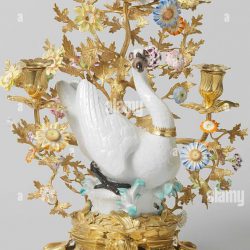
NO SWAN SO FINE / KEIN SCHWAN SO FEIN / NICI O LEBĂDĂ ATÂT DE FRUMOASA“No water so still as the
dead fountains of Versailles.” No swan,
with swart blind look askance
and gondoliering legs, so fine
as the chinz china one with fawn-
brown eyes and toothed gold
collar on to show whose bird it was.Lodged in the Louis Fifteenth
candelabrum-tree of cockscomb-
tinted buttons, dahlias,
sea-urchins, and everlastings,
it perches on the branching foam
of polished sculptured
flowers—at ease and tall. The king is dead.MARIANNE MOORE
…………
NICI O LEBĂDĂ ATÂT DE FRUMOASA
“Nici o apă atât de calma precum
fântânile moarte de la Versailles.” Nici o lebădă,
cu o privire neagra incremenita oblic
și picioare de gondolier, la fel de frumoasa
ca cea din portelanul de chinz, cu ochii caprui
și gulerul de aur dantelat,
pentru a arata cui apartine.Gazduita în candelabrul-copac
al lui Ludovic al XV-lea
cu nasturi de nuanta celosia,
cu dalii, cu scoici de mare, și vesnicii,
se așează pe spuma ramificată
a florilor sculptate lustruite –
confortabila și înalta. Regele este mort.……………
KEIN SCHWAN SO FEIN
„Kein Wasser so still wie der
tote Brunnen von Versailles. “Kein Schwan,
mit finsterem, blindem Blick schief
mit gondolierehaften Beinen, so fein
wie das Chinz-Porzellan mit reh-
braunen Augen und gezahntem Gold
mit einem Halsband, um zu zeigen, wessen Vogel er war.Untergebracht im Louis Quatorze
Kandelaber-Baum aus Hahnenkamm-
getönten Knöpfen, Dahlien,
Seeigeln und Strohblumen,
er sitzt auf dem sich verzweigenden Schaum
aus poliertem geformten
Blumen – bequem und groß. Der König ist tot.
trad. M. M. Biela
MARRIAGE / CASATORIE
POSTED IN classic poetry April 26, 2022
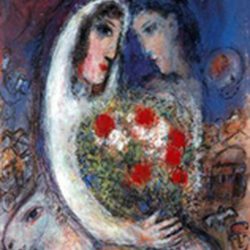
MARRIAGE / CASATORIEThis institution,
perhaps one should say enterprise
out of respect for which
one says one need not change one’s mind
about a thing one has believed in,
requiring public promises
of one’s intention
to fulfill a private obligation:
I wonder what Adam and Eve
think of it by this time,
this firegilt steel
alive with goldenness;
how bright it shows —
“of circular traditions and impostures,
committing many spoils,”
requiring all one’s criminal ingenuity
to avoid!
Psychology which explains everything
explains nothing
and we are still in doubt.
Eve: beautiful woman —
I have seen her
when she was so handsome
she gave me a start,
able to write simultaneously
in three languages —
English, German and French
and talk in the meantime;
equally positive in demanding a commotion
and in stipulating quiet:
“I should like to be alone;”
to which the visitor replies,
“I should like to be alone;
why not be alone together?”
Below the incandescent stars
below the incandescent fruit,
the strange experience of beauty;
its existence is too much;
it tears one to pieces
and each fresh wave of consciousness
is poison.
“See her, see her in this common world,”
the central flaw
in that first crystal-fine experiment,
this amalgamation which can never be more
than an interesting possibility,
describing it
as “that strange paradise
unlike flesh, gold, or stately buildings,
the choicest piece of my life:
the heart rising
in its estate of peace
as a boat rises
with the rising of the water;”
constrained in speaking of the serpent —
that shed snakeskin in the history of politeness
not to be returned to again —
that invaluable accident
exonerating Adam.
And he has beauty also;
it’s distressing — the O thou
to whom, from whom,
without whom nothing — Adam;
“something feline,
something colubrine” — how true!
a crouching mythological monster
in that Persian miniature of emerald mines,
raw silk — ivory white, snow white,
oyster white and six others —
that paddock full of leopards and giraffes —
long lemonyellow bodies
sown with trapezoids of blue.
Alive with words,
vibrating like a cymbal
touched before it has been struck,
he has prophesied correctly —
the industrious waterfall,
“the speedy stream
which violently bears all before it,
at one time silent as the air
and now as powerful as the wind.”
“Treading chasms
on the uncertain footing of a spear,”
forgetting that there is in woman
a quality of mind
which is an instinctive manifestation
is unsafe,
he goes on speaking
in a formal, customary strain
of “past states,” the present state,
seals, promises,
the evil one suffered,
the good one enjoys,
hell, heaven,
everything convenient
to promote one’s joy.”
There is in him a state of mind
by force of which,
perceiving what it was not
intended that he should,
“he experiences a solemn joy
in seeing that he has become an idol.”
Plagued by the nightingale
in the new leaves,
with its silence —
not its silence but its silences,
he says of it:
“It clothes me with a shirt of fire.”
“He dares not clap his hands
to make it go on
lest it should fly off;
if he does nothing, it will sleep;
if he cries out, it will not understand.”
Unnerved by the nightingale
and dazzled by the apple,
impelled by “the illusion of a fire
effectual to extinguish fire,”
compared with which
the shining of the earth
is but deformity — a fire
“as high as deep as bright as broad
as long as life itself,”
he stumbles over marriage,
“a very trivial object indeed”
to have destroyed the attitude
in which he stood —
the ease of the philosopher
unfathered by a woman.
Unhelpful Hymen!
“a kind of overgrown cupid”
reduced to insignificance
by the mechanical advertising
parading as involuntary comment,
by that experiment of Adam’s
with ways out but no way in —
the ritual of marriage,
augmenting all its lavishness;
its fiddle-head ferns,
lotus flowers, opuntias, white dromedaries,
its hippopotamus —
nose and mouth combined
in one magnificent hopper,
“the crested screamer —
that huge bird almost a lizard,”
its snake and the potent apple.
He tells us
that “for love
that will gaze an eagle blind,
that is like a Hercules
climbing the trees
in the garden of the Hesperides,
from forty-five to seventy
is the best age,”
commending it
as a fine art, as an experiment,
a duty or as merely recreation.
One must not call him ruffian
nor friction a calamity —
the fight to be affectionate:
“no truth can be fully known
until it has been tried
by the tooth of disputation.”
The blue panther with black eyes,
the basalt panther with blue eyes,
entirely graceful —
one must give them the path —
the black obsidian Diana
who “darkeneth her countenance
as a bear doth,
causing her husband to sigh,”
the spiked hand
that has an affection for one
and proves it to the bone,
impatient to assure you
that impatience is the mark of independence
not of bondage.
“Married people often look that way” —
“seldom and cold, up and down,
mixed and malarial
with a good day and bad.”
“When do we feed?”
We occidentals are so unemotional,
we quarrel as we feed;
one’s self is quite lost,
the irony preserved
in “the Ahasuerus tête à tête banquet”
with its “good monster, lead the way,”
with little laughter
and munificence of humor
in that quixotic atmosphere of frankness
in which “Four o’clock does not exist
but at five o’clock
the ladies in their imperious humility
are ready to receive you”;
in which experience attests
that men have power
and sometimes one is made to feel it.
He says, “what monarch would not blush
to have a wife
with hair like a shaving-brush?
The fact of woman
is not `the sound of the flute
but every poison.’”
She says, “`Men are monopolists
of stars, garters, buttons
and other shining baubles’ —
unfit to be the guardians
of another person’s happiness.”
He says, “These mummies
must be handled carefully —
`the crumbs from a lion’s meal,
a couple of shins and the bit of an ear’;
turn to the letter M
and you will find
that `a wife is a coffin,’
that severe object
with the pleasing geometry
stipulating space and not people,
refusing to be buried
and uniquely disappointing,
revengefully wrought in the attitude
of an adoring child
to a distinguished parent.”
She says, “This butterfly,
this waterfly, this nomad
that has `proposed
to settle on my hand for life.’ —
What can one do with it?
There must have been more time
in Shakespeare’s day
to sit and watch a play.
You know so many artists are fools.”
He says, “You know so many fools
who are not artists.”
The fact forgot
that “some have merely rights
while some have obligations,”
he loves himself so much,
he can permit himself
no rival in that love.
She loves herself so much,
she cannot see herself enough —
a statuette of ivory on ivory,
the logical last touch
to an expansive splendor
earned as wages for work done:
one is not rich but poor
when one can always seem so right.
What can one do for them —
these savages
condemned to disaffect
all those who are not visionaries
alert to undertake the silly task
of making people noble?
This model of petrine fidelity
who “leaves her peaceful husband
only because she has seen enough of him” —
that orator reminding you,
“I am yours to command.”
“Everything to do with love is mystery;
it is more than a day’s work
to investigate this science.”
One sees that it is rare —
that striking grasp of opposites
opposed each to the other, not to unity,
which in cycloid inclusiveness
has dwarfed the demonstration
of Columbus with the egg —
a triumph of simplicity —
that charitive Euroclydon
of frightening disinterestedness
which the world hates,
admitting:
“I am such a cow,
if I had a sorrow,
I should feel it a long time;
I am not one of those
who have a great sorrow
in the morning
and a great joy at noon;”
which says: “I have encountered it
among those unpretentious
protegés of wisdom,
where seeming to parade
as the debater and the Roman,
the statesmanship
of an archaic Daniel Webster
persists to their simplicity of temper
as the essence of the matter:
`Liberty and union
now and forever;’
the book on the writing-table;
the hand in the breast-pocket.”MARIANNE MOORE
……………….
CĂSĂTORIEAceastă instituție,
poate ar trebui să spunem întreprindere
din respect pentru
ce se spune că nu trebuie să te răzgândesti
in legatura cu un lucru în care ai crezut,
cerând promisiuni publice
ale intenţiei cuiva
de a îndeplini o obligație privată:
Mă întreb ce gandesc Adam și Eva
despre asta acum,
despre acest oțel de foc
viu si auriu;
cât de strălucitor arată —
„de tradiții circulare și imposturi,
comitând multe daune,’
necesitând toată ingeniozitatea criminală a cuiva
spre a fi evitat!
Psihologia care explică totul
nu explica nimic
si inca suntem in indoiala.
Eva: femeie frumoasa…
Am văzut-o
când era atât de frumoasă
incat m-a facut sa tresar,
capabila să scrie simultan
în trei limbi —
engleză, germană și franceză
si sa vorbeasca in acelasi timp;
liniara în a cere zgomot
si a impune incet:
“Aş vrea să fiu singura;”
la care vizitatorul răspunde,
“Aş vrea să fiu singur;
de ce să nu fim singuri împreună?
Sub stelele incandescente
sub fructul incandescent,
ciudata experiență a frumuseții;
existența sa e prea mult;
ne sfâșie în bucăți
și fiecare proaspăt val de conștiință
este otrava.
“Vezi-o, vezi-o în această lume comună,
defectul central
în acel prim experiment de cristal,
acest amalgam care nu poate fi niciodată mai mult
decât o posibilitate interesantă,
descriind-o
ca fiind “acel paradis ciudat
care nu seamănă cu carnea, aurul sau clădirile mărețe,
cea mai bună bucată din viața mea:
inima care se ridică
în starea sa de pace
așa cum se ridică o barcă
odată cu creșterea apei;
constrânsa să vorbească despre șarpe…
acea piele de șarpe lepadata în istoria politeții.
pentru a nu se mai întoarce la ea…
acel accident neprețuit
care l-a exonerat pe Adam.
Și are și frumusețe;
este dureros – O tu
la cine, de la cine,
fără de care nimic — Adam;
‘ceva felin,
ceva colubrin” — cât de adevărat!
un monstru mitologic ghemuit
în acea miniatură persană a minelor de smarald,
mătase brută… alb ca fildeșul, alb ca zăpada,
alb de stridii și alte șase…
acel padoc plin de leoparzi și girafe…
corpuri lungi și galbene ca lămâia.
semănate cu trapezuri de albastru.
Trăind cu vorbe,
vibrând ca un țambal
atins înainte de a fi lovit,
el a profețit corect…
cascada harnică,
“pârâul iute
care poartă cu violență totul în trecerea sa,
la un moment dat tăcut ca aerul
iar acum la fel de puternic ca vântul”.
“Călătorind prin abisuri
pe piciorul nesigur al unei sulițe,”
uitând că există în femeie
o calitate a minții
care este o manifestare instinctivă
este nesigur,
el continuă să vorbească
într-un ton formal, obișnuit.
despre “stări trecute”, despre starea prezentă,
peceți, promisiuni,
răul suferit,
binele de care se bucură cineva,
iadul, raiul,
tot ceea ce poate
favoriza bucuria cuiva.
Există în el o stare de spirit
prin forța căreia,
percepând ceea ce nu era
intenționat ca el să facă,
“el experimentează o bucurie solemnă
văzând că a devenit un idol”.
Chinuit de privighetoarea
din frunzele noi,
cu tăcerea ei…
nu tăcerea ei, ci tăcerile ei,
el spune despre ea:
“Mă îmbracă cu o cămașă de foc.
“Nu îndrăznește să bată din palme
pentru a o face să meargă
ca nu cumva sa zboare;
dacă nu face nimic, va dormi;
dacă strigă, nu va înțelege.
Nedumerit de privighetoare
și amețit de măr,
împins de “iluzia unui foc
eficace pentru a stinge focul”.
în comparație cu care
strălucirea pământului
nu este decât o deformare – un foc
“la fel de înalt, de adânc, de luminos, de larg
de lung ca viața însăși”.
el se împiedică de căsătorie,
“un obiect foarte banal, într-adevăr
să fi distrus atitudinea
în care se afla…
ușurința filosofului
neconceput de o femeie.
Hymen nefolositor!
“un fel de Cupidon supradimensionat
redus la nesemnificație
de publicitatea mecanică
defiland precum comentariu involuntar,
de acel experiment al lui Adam
cu căi de ieșire, dar fără cale de intrare…
ritualul căsătoriei,
sporind toată somptuozitatea sa;
ferigile sale cu cap de vioară,
flori de lotus, opuntias, dromaderi albi,
hipopotamul sau…
nas și gură combinate
într-un singur hopper magnific,
“țipătorul cu creastă…
acea pasăre uriașă aproape o șopârlă,’
șarpele său și mărul puternic.
El ne spune
că ” pentru dragostea
care va privi un vultur orb,
care este ca un Hercule
cațărăndu-se prin copaci
în grădina Hesperidelor,
de la patruzeci și cinci la șaptezeci de ani
este cea mai bună vârstă,
laudând-o
ca pe o artă frumoasă, ca pe un experiment,
o datorie sau ca simplă recreație.
Nu trebuie să-l numim bruta
nici fricțiunea un dezastru…
lupta să fie afectuoasă:
“nici un adevăr nu poate fi cunoscut pe deplin
până când nu a fost încercat
de dintele disputei’.
Pantera albastră cu ochi negri,
pantera de bazalt cu ochi albaștri,
în întregime grațioasă…
trebuie să le lăsăm calea…
Diana de obsidian negru
care “își întunecă chipul
așa cum face un urs,
făcându-si soțul să suspine”.
mâna țepoasa
care are o afecțiune pentru unul
și o dovedește până la epuizare,
nerăbdătoare să te asigure
că nerăbdarea este semnul independenței
și nu al robiei.
“Oamenii căsătoriți arată adesea așa”…
‘rar și rece, în sus și în jos,
amestecat și maladiv
cu o zi bună și una rea’.
‘Când ne hrănim?’
Noi, occidentalii, suntem atât de lipsiți de emoții,
ne certăm în timp ce ne hrănim;
sinele cuiva este destul de pierdut,
ironia este păstrată.
în “banchetul lui Ahasuerus tête à tête”.
cu al său “monstru bun, deschide drumul”.
cu râs putin
și umor din plin
în acea atmosferă quijotescă de franchețe
în care “Ora patru nu există”.
dar la ora cinci
doamnele în umilința lor imperioasă
sunt gata să te primească”;
în care experiența atestă
că bărbații au putere
și, uneori, cineva este făcut să o simtă.
El spune: “ce monarh nu ar roși
să aibă o soție
cu părul ca o perie de ras?
Faptul că femeia
nu este “sunetul flautului
ci orice otravă.”
Ea spune: “Bărbații sunt monopoliști
de stele, jartiere, nasturi
și de alte podoabe strălucitoare”…
nepotriviți pentru a fi gardienii
fericirii unei alte persoane.
El spune: “Aceste mumii
trebuie tratate cu grijă…
“firimiturile de la masa unui leu”,
câteva glezne și o bucată de ureche”;
treci la litera M
și vei găsi
că “o soție este un sicriu”.
acel obiect sever
cu o geometrie plăcută
care stipulează spațiul și nu oamenii,
refuzând să fie îngropata
și în mod unic dezamăgitor,
răzbunător forjata în atitudinea
unui copil adorator
față de un părinte distins”.
Ea spune: “Acest fluture,
acest fluture de apă, acest nomad
care a “propus
să se așeze pe mâna mea pe viață.” —
Ce poti face cu el?
Trebuie să fi fost mai mult timp
pe vremea lui Shakespeare
să stai și să te uiți la o piesă.
Știi ca atât de mulți artiști sunt neghiobi.
El spune, “Știi atât de mulți neghiobi
care nu sunt artiști”.
Faptul a uitat
că “unii au doar drepturi
în timp ce unii au obligații”.
se iubește atât de mult pe el însuși,
incat nu își poate permite
rival în această iubire.
Ea se iubește atât de mult,
incat nu se poate vedea suficient de mult…
o statuetă de fildeș pe fildeș,
ultima atingere logică
la o splendoare expansivă
câștigată ca salariu pentru munca depusă:
Cineva nu-i bogat, ci sărac.
când poate părea întotdeauna atât de corect.
Ce se poate face pentru ei…
acești sălbatici
condamnați sa dezarmeze
pe toți cei care nu sunt vizionari
gata sa isi asume sarcina prostească
de a face oamenii nobili?
Acest model de fidelitate petrină
care “își părăsește soțul pașnic
doar pentru că a văzut destul din el”…
acel orator care îți amintește,
“Sunt al tău sa poruncesti.
‘Tot ceea ce are legătură cu dragostea este un mister;
este mai mult decât o zi de muncă
să cercetezi această știință.
Se vede că este rar…
această uimitoare pricepere a contrariilor
opuse unul celuilalt, nu intregului,
care, în incluziune cicloida
a eclipsat demonstrația
lui Columb cu oul…
un triumf al simplității…
acel caritabil Euroclydon
de un dezinteres înspăimântător
pe care lumea îl urăște,
recunoscând:“Sunt așa o vacă.
dacă aș avea o tristețe,
aș simți-o mult timp;
Nu sunt unul dintre acei
care au o mare tristețe
dimineața.
și o mare bucurie la prânz;
care spun: “Am întâlnit-o
printre cei nepretențiosi
protejați ai înțelepciunii,
unde, părând sa defileze
ca orator și Roman,
guvernarea
unui arhaic Daniel Webster
persistă in simplitatea lor temperamentala
ca esență a problemei:`Libertate și uniune
acum și pentru totdeauna;cartea pe masa de scris;
mâna în buzunarul de la piept.trad. M. M. Biela
UNTER DEM LÄRM DES HAUSES / ÎN ZGOMOTUL CASEI / UNDER THE NOISE OF THE HOUSE
POSTED IN Roland April 26, 2022
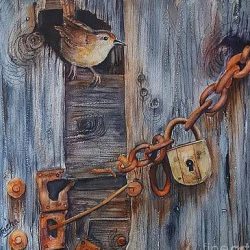
UNTER DEM LÄRM DES HAUSES / ÎN ZGOMOTUL CASEI / UNDER THE NOISE OF THE HOUSEFlüchtig gedenkst du wieder des Tages,
als er beim Lesen die Uhr abstellte,
das Fenster mit dichtem Schleier verhüllte,
die Tür mit Kette und Schloss zusperrte,
die tiefe, kaum rauschende Nacht anhielt
und sich am Zimmergrund unsichtbar machte.
Da ward er von Stille sacht erfüllt,
da strömten die grundlosen Lüfte ein
und rissen die dünnsten Webfäden durch,
bis er jäh beim Notschrei des Hauses erwachte,
aufschreckend sich anders besann.ROLAND ERB
……………..
ÎN ZGOMOTUL CASEI
Iti amintesti in treacat de ziua
in care a oprit ceasul în timp ce citea,
a acoperit fereastra cu un voal gros,
a încuiat ușa cu lanț și lacăt,
a oprit noaptea adanca, abia fosnind,
și s-a făcut nevazut in adancul camerei.
Apoi s-a umplut de tăcere,
apoi aerul lipsit de temei curgea inauntru
și sfasia cele mai subțiri fire de țesut,
până când s-a trezit brusc la strigătul de necaz al casei,
a tresarit si s-a razgandit.……………..
UNDER THE NOISE OF THE HOUSE
You fleetingly think back to the day
when he turned off his watch while reading,
covered the window with a thick veil,
locked the door with a chain and padlock,
stopped the deep, barely rustling night,
and made himself invisible at the bottom of the room.
Then he was filled with silence,
then the groundless air flowed in
and tore through the thinnest weaving threads,
until he awoke up abruptly at the cry of distress of the house,
startlingly changed his mind.trad. M. M. Biela
SO ZU SAGEN ICH / SO TO SPEAK I / EU CA SA ZIC ASA
POSTED IN Roland April 7, 2022
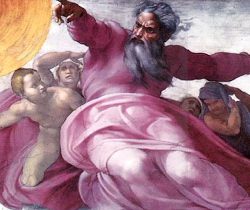
SO ZU SAGEN ICH / SO TO SPEAK I / EU CA SA ZIC ASAWarum
dies stumpfe Gesicht,
das ich schlagen möchte,
im Spiegel,
in der Verschlissenheit,
Unsicherheit,
was heute geschieht.
Soll ich
Entschlüsse fassen –
du wartest
dreizehn Sekunden, ach,
ein Jahrtausend,
irgendwo platzt
jetzt der bunte Ballon,
Gelächter lauthals,
das die Grimassen verziert,
und Sintfluten Schlamm,
die ein Gebirgsdorf verschütten,
während
das Seeziel
getroffen wird
(dort wo Aphrodite einst
Elementen entstieg).
Mein ur-uraltes Peru,
sonnenanbetend, mit
Blutopfern, schöne
Partien einer Landschaft, die stirbt.
Glorreiche Muskelspiele, dem
Sixtus
an die Kapellendecke gehext,
freilegen!
Das Würgen und das Erbrechen der
unerbittlichen Nacht,
wenn sie ihr Ende
nicht sieht.
Ob die Fiebernde ihre schale Brühe
geschlürft hat,
oder
sind die Schmerzen
zu stark in der Speiseröhre
nach dem heroischen halben Schritt
durchs Jahrhundert?
Die Kehle
ganz ausgedörrt, Herr
Marquis Posa,
alles so rot, glühend rot.
Von den niemals geschrieenen
Worten.
Und meine Glieder
in Ohnmachtsliebe
verstreut
auf dem zerfetzten Terrain.
D o c h a n B l u m e n f e h l t ‘ s i m R e v i e r .ROLAND ERB
…………….
SO TO SPEAK I
Why
this dull face
that I want to hit
in the mirror,
in the wear and tear,
uncertainty,
what is happening today.
Should I
make decisions –
you’re waiting
thirteen seconds, alas,
a millennium
somewhere now
the colorful balloon
is bursting,
loud laughter
that adorns the grimaces,
and deluges of mud,
burying a mountain village,
while hitting
the sea target
(where Aphrodite once
emerged
from the elements).
My primeval Peru,
worshiping the sun, with
blood sacrifices, beautiful
parts of a landscape that is dying.
Reveal glorious muscle flexions,
with the bewitched Sixtus
on the chapel’s ceiling!
The gagging and vomiting of the
unrelenting night,
when she doesn’t see
her end.
Whether the feverish sipped
its stale broth,
or
is the pain
in her esophagus too severe
after the heroic half step
through the century?
The throat is
all parched, sir
Marquis Posa,
everything so red, glowing red.
From the never-screamed
words.
And my limbs
in fainting love
scattered
on the tattered terrain.
B u t t h e f l o w e r s a r e m i s s i n g i n t h e p r e c i n c t!…………..
EU CA SA ZIC ASA
De ce
acest chip tern
pe care vreau să-l lovesc
în oglindă,
în uzura,
incertitudinea
a ceea ce se întâmplă astazi.
Trebuie să iau hotariri-
astepti
treisprezece secunde, vai,
un mileniu
undeva acum balonul colorat
explodeaza,
râsete zgomotoase
care impodobesc grimasele,
si potopuri de noroi
care îngroapă un sat de munte,
in timp ce
ținta mării
este lovita
(acolo, unde, candva, Afrodita a aparut
din elemente).
Peru-ul meu primordial,
adorator al soarelui, cu
sacrificii de sânge, parti frumoase
ale unui peisaj care moare.
Dezvaluie
magnifice flexii musculare
cu Sixtus
fermecat pe tavanul Capelei!
Strangularea și vărsăturile
noaptii necruțătoare,
când ea nu-si vede
sfarsitul.
Oare cea febrila a sorbit
supa ei statuta
sau
durerea din esofag
este prea puternica
după eroica jumătate de pas
de-a lungul secolului?
Gatul
complet uscat, domnule
Marchiz Posa,
totul atât de roșu, roșu strălucitor.
De cuvintele
nicodata strigate.
Și membrele mele
risipite
în dragoste neputincioasa
pe terenul sfâşiat.
D a r f l o r i l e l i p s e s c i n c a r t i e r .
trad. M. M. Biela
AUCH HEUTE / TODAY AS WELL / CHIAR ȘI ASTAZI
POSTED IN Roland April 7, 2022
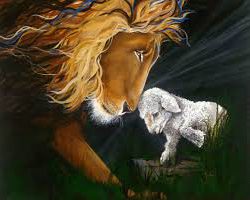
AUCH HEUTE / TODAY AS WELL / CHIAR ȘI ASTAZIAuch heute und jeden Tag,
ich in meiner Beschränkung,
in meiner Isolation,
im Aufsparn der Kräfte,
der alten, unausschöpflichen Kräfte,
die ich nicht nach dem Herzen
anspannen kann.ROLAND ERB
…………..
TODAY AS WELL
Even today and every day
I in my limitation
in my isolation
in conserving the strength,
the ancient, inexhaustible strength,
which I cannot harness according
to the heart.……………
CHIAR ȘI ASTAZI
Chiar și astăzi și în fiecare zi
eu, in limitarea mea
în izolarea mea,
în a-mi conserva fortele,
vechile, inepuizabilele forte
pe care nu le pot exploata
conform inimii.trad. M. M. Biela
ADEMENIREA / THE LURING
POSTED IN Romanian April 7, 2022
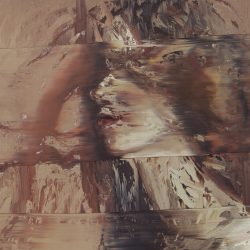
ADEMENIREA / THE LURING
Stau între pumn și destinația lui – spunDar tu intră în poemele mele. Dormi. Scrie. Respiră.
Stapânește pământul. Stăpânește-ți femeile tale. Culcă-te sub
ochii mei
cu oricare dintre eleEu mă așez – reflex mereu zi de zi –
între pumn și destinația lui
Recunosc: e locul meu spaima mea. Aici le concep
aici le port aici le nasc pe ele poemele:
din violență le smulgNu te iubesc. Nu. Cu mâinile vârâte până la coate
în buzunare
fluier
îți fluier în față: nu te iubesc
tu carnasierule ispită cauză ultimă a nesomnului
Cu mâinile în buzunare hulesc
te hulesc
Mint că nu am nevoie de tineNu dorm – deci nu te visez
Pur și simplu mă plimb prin lume cu imaginea ta
ca o schijă fierbinte
înfiptă în mine
pur și simplu te tutuiesc fără rușine
te mototolesc te înfrâng vreau din gura mea să te scuip
te-ntrerup te huiduiesc
ca evreii pe Dumnezeul cel așteptat și-ntrupat
ca evreii la Paști pe MesiaDar vino în poemele mele:
ești unicornul pe care vreau să-l pecetluiesc într-un vers
ca-ntre gratii cu șapte zăvoareTe poftesc oho te poftesc. Și știu legea
(memoria mea mi-o repetă răspicat):
nu te ating nu te ating nu te atingLocul meu e pentru totdeauna fixat: între pumn
și destinația lui. Aici
în rana mea intră și tu:
iubește-ți femeile culcă-te cu oricare din ele mie imi ești
interzis
(însă poartă-mă-n nări în văz în auz
poartă-mă
ca pe o remușcare acută ca pe-o vinovăție împlinită
acolo la tine în creier)Poruncesc: intră-n poem tolănește-te-n el:
în spațiile albe dintre versuri dintre negații
îți permit să-ți faci loc – deci respiră
MARTA PETREU…………..
THE LURING
I stand between the fist and its destination – I sayBut you enter my poems. Sleep. Write. Breathe.
Master the earth. Master your women. Lie under
my eyes
with any of themI situate myself – reflex always day by day –
between the fist and its destination
I admit: it’s my place my fear. Here I conceive them
here I bear them here I birth them the poems:
from violence I snatch themI do not love you. No. With hands up to my elbows
in my pockets
I whistle
I whistle in your face: I don’t love you
you predator temptation the ultimate cause of sleeplessness
With my hands in my pockets I boo
I boo you
I lie that I don’t need youI don’t sleep – so I don’t dream of you
I simply walk through the world with your image
like a hot shrapnel
stuck in me
I simply call you by name shamelessly
I’m crumpling you I’m defeating you I want to spit you out of my mouth
I interrupt you I’m booing you
like the Jews, the God who was expected and begotten
like the Jews at Easter the MessiahBut come into my poems:
You are the unicorn I want to seal in a verse
like between the bars with seven latchesI invite you, oh, I invite you. And I know the law
(my memory repeats it to me bluntly):
I won’t touch you I won’t touch you I won’t touch youMy place is forever fixed: between the fist
and its destination. Here
Into my wound you enter too:
love your women sleep with any of them you’re
forbidden to me
(but carry me in your nostrils in your sight in your hearing)
carry me
as a keen remorse as a guilt fulfilled
there in your brain)I command: enter the poem, lie idle in it:
in the white spaces between the lines between the negations
I’ll allow you to make room – so breathetrans. M. M. Biela
WOLHYNIEN / VOLÂNIA / VOLHYNIA
POSTED IN Roland April 7, 2022

WOLHYNIEN / VOLÂNIA / VOLHYNIA
Das Wort
fiel im Traum,
ich sah, wie ich mein eigenes
Grab schaufeln musste.
Die Erde war hart
gefroren mit
riesigen Kieseln,
ich hatte bald
brennende Blasen
an beiden Händen,
ich schwitzte, ich fror, ich
konnte nicht denken.
Hinter mir,
mit dem Gewehr mein Wächter,
er trieb mich
mit fremdem, deutschem Kommando,
sobald ich erlahmte.
Mitten im Krieg wars
im Traum,
ich trug einen schütteren Bart,
graue Schläfenlocken,
stand schräg
im zerschlissenen Kittel.
Ich grub und konnte nicht
fertig werden.
ROLAND ERB………….
VOLÂNIA
Cuvantul
a cazut in vis
M-am văzut cum
trebuia sa-mi sap propriul mormânt.
Pământul era inghetat,
tare, cu
pietricele imense,
am avut in curand
bășici arzătoare
la palmele amandoua,
transpiram, înghețam,
nu puteam gândi.
În spatele meu,
gardianul cu pusca lui,
ma impingea
cu o comandă străină, germană,
de îndată ce ma inmuiam.
Era în mijlocul războiului,
într-un vis,
purtam o barbă rara,
perciuni cenusii,
stăteam aplecat,
într-o salopeta zdrențuită.
Săpam și nu puteam
termina.
…………….VOLHYNIA
The word
fell in a dream,
I saw how
I had to dig
my own grave.
The ground was frozen
hard with
huge pebbles,
I had soon
burning blisters
on both hands,
I was sweating, I was freezing, I
couldn’t think.
Behind me,
my guard with his gun ,
he drove me
with foreign, German commands,
as soon as I got tired.
It was in the middle of the war
in a dream
I wore a thinning beard
gray side-locks,
stood askew
in a tattered overall.
I was digging and I couldn’t
finish.trad. M. M. Biela

Copyright © 2024 by Magdalena Biela. All rights reserved.